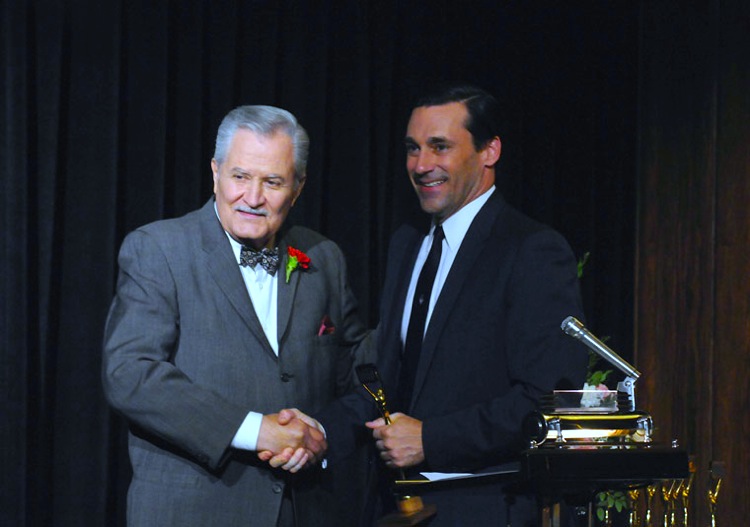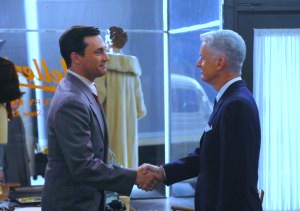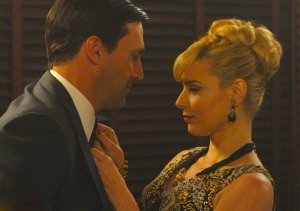
By Jennifer Baldwin. This week, Don wins a Clio award (on the same night Mad Men is up for Best Drama at the Emmys … Hey! I see what you did there, Matt Weiner!)
• Peggy and the new guy in creative (Stan Rizzo, played by actor Jay R. Ferguson) turn nudists for the night so they can finally get some work done on the Vicks cough drop account.
• Roger’s wife, Jane, sends her inept cousin, Danny, to SCDP to try to get a job using a portfolio filled with other people’s ads – and one lame-brained original idea he recycles over and over and over (and over) again.
• Ken Cosgrove gets hired by SCDP, but Pete’s withering stare and boss-man attitude turn poor Ken from cocksure account man to chastened puppy dog.
• And Roger writes his memoirs.
And, oh yeah: Don has finally lost it. No matter his personal problems in the past three seasons, Don has always been a star when it comes to advertising. When he’s in the room with a client, he’s golden. He’s always got a clever slogan or a winning ad campaign, and even when the clients don’t go for Don’s ideas, we the audience can tell that Don is an advertising genius. But in this episode, Don’s drinking, his depression, his out of control behavior — it all catches up to him and he flounders and embarrasses himself in the boardroom with the clients. It was painful.
Don — drunk as a skunk — pitches his idea to the Life cereal execs, but they find the idea too ironic, too clever and worry that their Middle America customers won’t get the joke. Don’s horrible attempts to come up with a new slogan on the fly are so excruciating to watch, I almost had to avert my eyes. When he finally steals a lame-brained idea from poor Danny Siegel (“The cure for the common … breakfast”), of course the Life execs love it. Weiner really is trying to destroy the Don Draper mystique, isn’t he?
Don’s drinking and self-destruction have gotten so out of control that he wakes up on Sunday morning thinking it’s Saturday — he missed an entire day thanks to drink — and forgets to pick up his kids from Betty. He got wasted at the Clio awards after-party on Friday night, met a brunette there, and took her back to his apartment.

In a beautifully done bit of filmmaking and cinematic screenwriting, we close-up on Don’s face as he lies in bed and the brunette from the Clios makes her way down his torso and out of view. The lighting of the scene is dark; it’s night. Don closes his eyes and falls asleep. Slowly a bright light glides in — the light from the sun that we think indicates the next morning.
But Betty’s phone call awakens Don, her furious anger is as disorienting for us as it is for Don, until the camera cuts to another shot and we get an ever-so-slight glimpse at the woman in bed with him — a blonde! Not the woman from the Clios! The way the scene plays out, we are as confused and distraught as Don. The moment we realize just what has happened, we feel that same punch to the gut that Don must feel. He’s lost an entire day. He’s slept with a woman and doesn’t even remember meeting her. He’s missed his day with the kids thanks to his out of control drinking. I know I’ve said this before for other moments in season four, but this moment is rock bottom for Don.

“Waldorf Stories” is an episode of parallels and pairs, opposites and foils. A young Don (from Roger’s flashbacks) and Danny Siegel as the eager, pushy newbies trying to break into the ad game. A younger Roger (in his flashbacks) and present-day Don are the older, established execs; functioning (and not always functioning) alcoholics who end up giving the young neophytes jobs thanks to the influence of booze. Peggy, the girl who seems old fashioned and prudish but is really liberated, and Stan, the guy who claims to be liberated but can’t really handle it when Peggy calls his bluff. Pete and Ken, opposites in almost every way, rivals since the first season, with Pete usually on the losing end — only this time, Pete, in almost Michael Corleone-style fashion, brings Ken to heel.
And then there’s Faye Miller and the brunette from the Clio awards after-party. Again, Don tries to put the moves on Faye and she wisely resists. But the brunette throws herself at Don. She’s caught up in his success and new-found fame, and, of course, his good looks. She sleeps with him right away and she is a symbol of everything that is destructive in Don’s life: the drunkenness; the pursuit of prestige and acclaim; the selfishness; the meaninglessness; the empty nothingness. Don has just won his industry’s highest award and in the end, he has nothing. He’s so drunk, he forgets his Clio at the bar. He’s so drunk, he forgets his kids.
In a nice touch, we find out that Roger made sure to hold onto the Clio at the bar and he gives it to Don later. The friendship between Roger and Don is one of the few real relationships Don has left. But as it is right now, I doubt that their relationship will be enough to save Don from self-destruction.
Is Faye Miller Don’s last hope?
Posted on September 3rd, 2010 at 10:03am.
Why does the show’s creator want to see Don Draper completely crash and burn? Wouldn’t that kind of end the character arc for him and make the series unwatchable? Where do they go from there? It sounds like they’re trying to just condemn this kind of more traditional male by showing him to be a complete slimebag.
Thanks for the comment, Sydney!
I don’t think the show is trying to condemn the traditional male. Don Draper is too enigmatic, with a bizarre and unconventional back story, to really be representative of THE “traditional male.” He’s too singular.
I think Weiner is much more concerned with showing how the breakdown of traditional social mores can destroy people on a personal level. Once we lose the social cohesion provided by things like marriage and family, we are adrift in life. We no longer have a sense of ourselves, so we have to make it up on our own and that can be a messy business.
Don was never a paragon of virtues (his serial cheating being the obvious example), but now that he is a divorced man, we are seeing how the loss of stability and social cohesion provided by marriage and family has set him adrift. He is externally “freer” to “be himself” now that he’s divorced, but he’s certainly not any happier with his life. He doesn’t seem to know what to do with himself except get drunk, sleep around, and throw himself into his work even more.
He might have been constantly lying to Betty while they were married, and breaking his marriage vows at every turn, but at least while he was married he was trying to be something better than himself. Now, all he has is himself and that’s why he’s drowning.
OK…a near miss with Faye. I thought there would be a passion play in this episode…but it petered out in the kitchen…and it is about time, that attention was placed on Don’s drinking.
They all seem to drink so damn much during the working day…and beyond… that I cannot fathom how they function. Of course, in that era of booze and broads and Sinatra’s Rat Pack, a man had to be able to do it all after consuming a 22oz steak combined with half liter of whiskey and a pack of Camels (or Lucky Strikes in this case). I watched my father (WWII generation) do that for 30+ years and still get up for work every day!
The best line was delivered by Joan/Hendricks (whom deserves her sex symbol status MORE than any Hollywood female in a long time thanks to BOTH her looks and the way she acts which is classier than the rest of the herd of talentless bland felines that are in the business these days) to Roger as he continued drinking at the bar, ” You crossed the border from lubricated to morose.” That kind of sums up the whole episode.
For a minute there, I was afraid Faye would go home with Don and I’d fail in my prediction! 😉
You are so right about Christina Hendricks too. “Classy” is the perfect descriptor. Her sex appeal is based on both her fabulous figure AND her classy, witty personality. She’s sexy but never dirty or crass. That line you mention is just one in a string of hilarious, biting comebacks and comments that Joan delivers with relish. She combines the full-bodied sexiness of Marilyn Monroe with the playful intelligence of someone like Claudette Colbert.